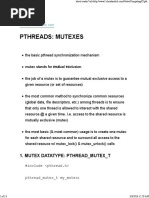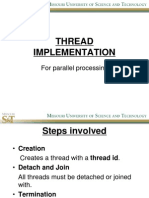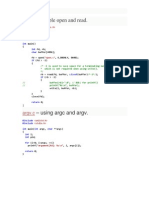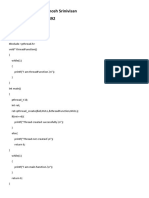Deadlock Using C in Linux
Uploaded by
UuiiDeadlock Using C in Linux
Uploaded by
UuiiProgram to create Deadlock Using C in
Linux
Deadlock in operating system is a situation which occurs when a process or thread enters a
waiting state because a resource requested is being held by another waiting process, which in
turn is waiting for another resource held by another waiting process. In a deadlock state a process
is unable to change its state(waiting) indefinitely because the resources requested by it are being
used by another waiting process.
Setup
To simulate deadlock in the system we will create the above shown situation.
P1 and P2 will be represented by two thread one and two.
The two resources R1 and R2 will be represented by the two lock variables first_mutex and
second_mutex
First thread one will acquire lock first_mutex and then thread two will acquire lock
second_mutex. Hence, both the threads have acquired one resource each. Next, thread one will
try to acquire lock second_mutex while the second thread, thread two will try to acquire lock
first_mutex. Since the resources are already occupied by the other thread, both the threads will
get into a deadlock.
Note: You must know how to create Threads to understand this program
Program to create Deadlock Using C in Linux using Mutex Locks and threads
#include<stdio.h>
#include<pthread.h>
#include<unistd.h>
void *function1();
void *function2();
pthread_mutex_t first_mutex; //mutex lock
pthread_mutex_t second_mutex;
int main() {
pthread_mutex_init(&first_mutex,NULL); //initialize the lock
pthread_mutex_init(&second_mutex,NULL);
pthread_t one, two;
pthread_create(&one, NULL, function1, NULL); // create thread
pthread_create(&two, NULL, function2, NULL);
pthread_join(one, NULL);
pthread_join(two, NULL);
printf("Thread joined\n");
}
void *function1( ) {
pthread_mutex_lock(&first_mutex); // to acquire the resource/mutex lock
printf("Thread ONE acquired first_mutex\n");
sleep(1);
pthread_mutex_lock(&second_mutex);
printf("Thread ONE acquired second_mutex\n");
pthread_mutex_unlock(&second_mutex); // to release the resource
printf("Thread ONE released second_mutex\n");
pthread_mutex_unlock(&first_mutex);
printf("Thread ONE released first_mutex\n");
void *function2( ) {
pthread_mutex_lock(&second_mutex);
printf("Thread TWO acquired second_mutex\n");
sleep(1);
pthread_mutex_lock(&first_mutex);
printf("Thread TWO acquired first_mutex\n");
pthread_mutex_unlock(&first_mutex);
printf("Thread TWO released first_mutex\n");
pthread_mutex_unlock(&second_mutex);
printf("Thread TWO released second_mutex\n");
You might also like
- AOS - Lab - Skill - I&II - Synchronization, Shared Memory ProgrammingNo ratings yetAOS - Lab - Skill - I&II - Synchronization, Shared Memory Programming8 pages
- Lab Assignment 6-Process SynchronizationNo ratings yetLab Assignment 6-Process Synchronization7 pages
- Lecture 9 Programming Shared Address Space Platforms using POSIX Thread API.pptxNo ratings yetLecture 9 Programming Shared Address Space Platforms using POSIX Thread API.pptx35 pages
- Thread Implementation: For Parallel ProcessingNo ratings yetThread Implementation: For Parallel Processing42 pages
- PrakW9S03 Multithreading Using Posix ThreadNo ratings yetPrakW9S03 Multithreading Using Posix Thread4 pages
- Pthreads, Locks, Semaphores: CS 241 Discussion Section 3 6 February - 9 FebruaryNo ratings yetPthreads, Locks, Semaphores: CS 241 Discussion Section 3 6 February - 9 February22 pages
- BITS, Pilani - Hyderabad Campus Operating Systems (CS F372)No ratings yetBITS, Pilani - Hyderabad Campus Operating Systems (CS F372)5 pages
- Operating System Lab Journal 13: Title: Synchronization Through SemaphoresNo ratings yetOperating System Lab Journal 13: Title: Synchronization Through Semaphores2 pages
- Chapter 6 - Synchronization Tools - Part 2No ratings yetChapter 6 - Synchronization Tools - Part 232 pages
- Experiment 35: Illustration of Thread Management On Windows-Nt AIM: To Write A Program To Illustrate of Thread Management Functions TheoryNo ratings yetExperiment 35: Illustration of Thread Management On Windows-Nt AIM: To Write A Program To Illustrate of Thread Management Functions Theory10 pages
- Nested Transactions Nested TransactionsNo ratings yetNested Transactions Nested Transactions11 pages
- Memory Consistency Model: Ack: Prof. Sarita Adve, UIUCNo ratings yetMemory Consistency Model: Ack: Prof. Sarita Adve, UIUC27 pages
- MCQ BCA 2 Year Unit-2 Operating System.No ratings yetMCQ BCA 2 Year Unit-2 Operating System.26 pages
- OpenMP Tutorial - Lawrence Livermore National LaboratoryNo ratings yetOpenMP Tutorial - Lawrence Livermore National Laboratory75 pages
- Operating Systems: The Critical-Section ProblemNo ratings yetOperating Systems: The Critical-Section Problem26 pages
- 23CSE214 - OS Mid Lab Evalution (27.02.27)-v1No ratings yet23CSE214 - OS Mid Lab Evalution (27.02.27)-v12 pages
- Subject Name Parallel and Distributed Computing100% (1)Subject Name Parallel and Distributed Computing3 pages
- Opearating System (OS) BCA Question Answers Sheet Part 2No ratings yetOpearating System (OS) BCA Question Answers Sheet Part 22 pages
- Shortest Time Quantum Scheduling AlgorithmNo ratings yetShortest Time Quantum Scheduling Algorithm4 pages
- DD The Superior College Lahore: Bscs 5CNo ratings yetDD The Superior College Lahore: Bscs 5C15 pages
- Parallel Programming With: MPI For PythonNo ratings yetParallel Programming With: MPI For Python17 pages

























































































